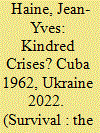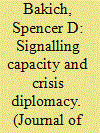|
|
|
Sort Order |
|
|
|
Items / Page
|
|
|
|
|
|
|
| Srl | Item |
| 1 |
ID:
154931


|
|
|
|
|
| Summary/Abstract |
Whatever motivations lie behind North Korea’s nuclear and missile programs, North
Korea has been aware that further nuclear and missile tests would incur increasingly
harsh international sanctions. In order to survive the sanctions, North Korea needs
to entrap China to its side, for the North Korean economy is highly dependent upon
China. In this context, this article argues that North Korea intentionally increases
the level of its nuclear and missile threat in order to entrap China (thus, reducing its
fear of being abandoned by China). That is, North Korea has elaborated its coercive
diplomacy in order to press China to show a strong commitment to their mutual
alliance. In order to develop the above argument, this article proceeds as follows.
First, as an analytical framework, it applies Glenn Snyder’s concept of the linkage
between the alliance game and adversary game to the trilateral relationship among
the United States (along with South Korea), China and North Korea. Second, it
provides an overview of Sino–North Korean relations from 2006 up to the present,
attempting to analyze North Korea’s brinkmanship. Thirdly, it concludes with some
policy implications for future trilateral relations, one of which is that China should
seriously discuss North Korea contingency plans with the United States and South
Korea in order to develop an effective strategy to curb North Korea’s military
adventurism. Paradoxically, this would lead to North Korea’s fully considering
China’s position.
|
|
|
|
|
|
|
|
|
|
|
|
|
|
|
|
| 2 |
ID:
192116


|
|
|
|
|
| Summary/Abstract |
Beijing has played a long game on Taiwan for more than seventy years. Starting with Mao Zedong’s aborted aspiration of military liberation in 1949, Deng Xiaoping, Jiang Zemin, and Hu Jintao focused on peaceful unification although they never renounced the use of force. With the rhetoric of striving for peaceful unification, Xi Jinping has relied more on brinkmanship to press Taiwan to accept his hardened terms of unification. Xi has made clear that the Taiwan question is China’s core national interest and essentially non-negotiable, important enough to go to war if pushed. China as a ‘divided nation’ cannot sit well with Xi’s China Dream, the catch-all term for Xi’s ambition for great-power status. Riding on the nationalist currents he whipped up, Xi will end the long game according to his timetable, or sooner if the brinkmanship fails and the red lines crossed, whether China is ready or not.
|
|
|
|
|
|
|
|
|
|
|
|
|
|
|
|
| 3 |
ID:
188805


|
|
|
|
|
| Summary/Abstract |
There are numerous material differences between the Cuban Missile Crisis and the Ukraine conflict, and any comparison must be cautious. The international system is now multipolar, which makes the current conflict more complex and more global, but also potentially more tractable. The theory of nuclear deterrence has also become far more refined, and deterrence itself presumptively more stable. The Cuban Missile Crisis occurred in a very short time span, while the current conflict in Ukraine has been ongoing for one year and counting. One prominent similarity between the two crises is mutual miscalculation. In addition, both crises involve a risk-courting personalist dictator. Furthermore, Russian President Vladimir Putin’s willingness to flirt with nuclear brinkmanship, much like Nikita Khrushchev’s in 1962, raises the question of his rationality. The paramount lesson for the Ukraine crisis from the Cuban one may be the necessity of dialogue.
|
|
|
|
|
|
|
|
|
|
|
|
|
|
|
|
| 4 |
ID:
186900


|
|
|
|
|
| Summary/Abstract |
In the 2017 U.S.-North Korea nuclear crisis, the Trump administration’s ‘maximum pressure’ strategy failed to achieve its objectives of the complete, irreversible, verifiable denuclearization (CVID) of the DPRK, and induced escalation pressures that brought the two countries to the brink of war. A deficit in signalling capacity (i.e. biased intelligence portfolio, lack of diplomatic-military integration, and inflexible military doctrine and war plans) prevented Washington from managing the crisis, creating the conditions for its strategic failure. The signalling capacity framework offers a comprehensive approach to explaining the outcome of the 2017 crisis, outperforming audience cost and brinkmanship theories.
|
|
|
|
|
|
|
|
|
|
|
|
|
|
|
|
| 5 |
ID:
095759


|
|
|
|
|
| Publication |
2010.
|
| Summary/Abstract |
The relationship between America and North Korea is wavering between confrontation and communication depending on the policy choices of President Obama and Kim Jong Il. To have a realistic outlook upon the situation, it would be of significant value to categorize the relationship and to determine the South Korean government's countermeasures based on these categories. Based on the U. S.-North Korea relationship, four categories can be extracted. Soft-line and hard-line policies are possible political choices, and scenarios will be put forward based on a mixture of the two. South Korea's response to each category is reviewed in this paper.
|
|
|
|
|
|
|
|
|
|
|
|
|
|
|
|
| 6 |
ID:
152817


|
|
|
|
|
| Summary/Abstract |
Unrecognized statelets may be forming in the Eastern Donbas region of Ukraine under the aegis of Russian protection—a “frozen conflict.” Georgia's past provides a useful cautionary tale in reference to Ukraine's probable future. The very same conceptual debates that are currently underway in the West with respect to Ukraine—“credibility of great-power security guarantees versus chain-ganging”—have, over the past twenty years, generated policies that facilitated the rise of political coalitions within Georgia that prefer war with Russia to any other outcome.
|
|
|
|
|
|
|
|
|
|
|
|
|
|
|
|
|
|
|
|
|